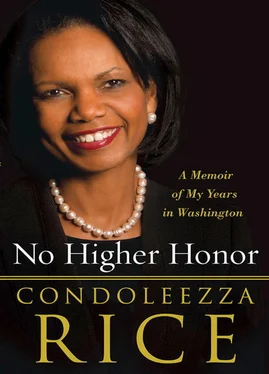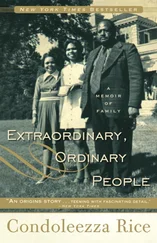A second option would have been to adopt a sanctions-only approach, trying to squeeze the regime until it either collapsed or changed its policy. The first outcome seemed unlikely. The Kim dynasty had survived for more than half a century despite isolation from the United States and the international community.
The possibility of simply squeezing the regime into submission was tempting but likely to fail. The North Koreans were already heavily sanctioned and still they had detonated a nuclear device and proliferated nuclear knowledge to Syria. There was no evidence that sanctions alone were changing their behavior or slowing their path to even more sophisticated nuclear technology.
The punitive measures that were put in place undoubtedly helped spur the North toward sporadic cooperation. Still, the imposition of sanctions in the absence of a willingness to negotiate seriously serves only to isolate the United States from its allies. Maintaining a coalition against Kim Jong-il required us to keep the onus for recalcitrance on the North. And in truth, without concerted actions from others, American unilateral penalties were unlikely to bring an end to North Korea’s ambitions. In the final analysis, Beijing was willing to go only so far in pressuring the North. While a nuclear North Korea was unwelcome, the collapse of Kim’s regime was thought to be worse given that the resulting instability could spill over into bordering Chinese territories. That concern, which heightened after Kim’s stroke in 2008, was a serious constraint.
Confronted with these options, we chose to give multilateral diplomacy—backed by the punitive measures already in place—a chance. This produced a careful set of requirements that China, Russia, Japan, South Korea, and the United States placed upon the North. The diplomacy had produced results. When Pyongyang complied with its obligations—producing information that we otherwise would not have had, disabling significant parts of their nuclear infrastructure, and permitting American inspectors on the ground—we took reciprocal steps of our own. When Pyongyang refused to meet its obligations, we, in response, refused to move forward.
We had to make a choice: allow the North Koreans’ expanding nuclear capability (which included processed nuclear material that could be sold or transferred) to continue unchecked and unmonitored, or try to enlist the Chinese to stop them. The idea that we could bomb the Syrian reactor to make a point about proliferation in the face of uncertain intelligence was, to put it mildly, reckless. I told the Chinese that the North Koreans had done something stupid and venal in assisting Damascus and that it was time for Beijing to step up. But they (and the rest of the region) would have never tolerated the military strike that the Vice President recommended. In the eleventh hour of the administration, we decided to make one more diplomatic push. As a result, the North Koreans remained isolated in the region and the incoming President was not confronted with a crisis on the peninsula on day one of his term.
At least in giving the diplomatic track its best shot, the United States can’t be blamed for what North Korea has done. But the truth is that until the tyrannical regime is gone, no one can rest easily, given its dangerous possession of a nuclear capability.

56
THE FINANCIAL CRISIS OF 2008
WHEN THE PRESIDENT asked me to come back to Washington, we didn’t want to tip the press that an announcement about North Korea was coming. There were scores of State Department officials with me, and my sudden return to the capital was bound to be noticed. “Tell them you have to come back and help on some matters related to the financial crisis,” the President said.
“Well, I do,” I said. It wasn’t just a ruse.
In the summer of 2008, we were experiencing a number of problems in the global economy. Oil prices spiked to nearly $140 a barrel, causing problems for growth as well as driving food prices skyward and sparking riots around the world. The sudden surge enhanced the diplomatic leverage of such U.S. adversaries as Hugo Chávez and the Iranians. When I was a Chevron director, I had often commented that the politics of oil was geopolitics with a capital “G,” and now we were experiencing that firsthand. Chávez, for instance, was using his excess profits to influence elections across Latin America.
It was very difficult to address the energy problem coherently within the international system, but we did manage to put together a number of energy partnerships, largely through the good work of Gregory Manuel, whom I had brought to the State Department. Greg had been my student at Stanford and had worked for me at the NSC in the economics directorate. I needed someone who would be indefatigable and dogged in bringing the various interested parts of the State Department together to pursue energy initiatives. He worked with Reuben Jeffery to push work in the area forward and to maintain at least a dialogue with other countries.
That work paid off, yielding—as just one example—a comprehensive partnership with Brazil in the area of biofuels as an alternative energy source. Given the obvious benefits of energy policies that could reduce individual nations’ dependence on oil, it should have been easier to bring the countries of the world together. I had, for instance, hoped to draw the Central Asians—particularly Kazakhstan—into greater dialogue about energy security in South-Central Asia and beyond. But it was hard, and I never really had the time to devote to that important portfolio. It was an area that cried out for international leadership.
We were under such pressure on so many other issues that, too often, longer term economic issues of that kind did not receive the consistent effort they deserved. But in the fall of 2008, despite North Korea, Iran, Middle East peace, Iraq, and a host of other issues, the financial crisis was suddenly front and center and demanded attention.
My most important role in that regard was to support Hank Paulson in a period of extraordinary crisis that reminded me of the early days after 9/11. Each development brought new uncertainties, which demanded a mobilization of financial and economic resources on a scale not seen since the Great Depression. At Hank’s request, I sent Reuben Jeffery from State to work alongside David McCormick, the under secretary of the treasury for international affairs. Reuben would stop in to brief me on the latest news at the beginning and end of each day. As the crisis unfolded and then accelerated, Hank and I met with the President most mornings during the time usually reserved for the intelligence briefing. Hank would enter with yet another horror story of a bank failure and news that lending had ground to a halt. The economy was in grave trouble. One night at a reception in the East Room, Josh Bolten called me aside. “You probably ought to know that Goldman and Morgan Stanley could fail tomorrow,” he whispered.
“What?” I said. That’s the way it was—every day brought very bad news.
I didn’t have anything to offer in terms of economic advice, but it wasn’t hard to see the effect on leaders and diplomacy. Hank would handle relations with the first-order countries, but I promised to help with those that he didn’t have time to reach. I just wanted to show the world that we were on top of it, so every morning I’d call Hank’s chief of staff, Jim Wilkinson, who’d previously worked for me as a senior aide. “What are we saying today?” I would ask. It was dizzying and disconcerting.
In the depths of the crisis, the President held a meeting at Camp David with French President Nicolas Sarkozy and José Barroso, the president of the European Commission. Sitting at the same table where we’d responded to 9/11 and planned two wars, I listened to the leaders’ dismay at their inability to stem the tide of the crisis. Economic policy had so many more moving parts than even the complicated issues I was used to managing. The President and Sarkozy agreed to hold a meeting of the G20 leaders, just to reassure them and show confidence. Right before our eyes, a new international balance was unfolding. No one spoke of convening the G7 or G8. China, Brazil, India, and others had to be at the table. All of a sudden, Sarkozy said, “It has to be in New York! The crisis started in New York, so it has to be there!”
Читать дальше













